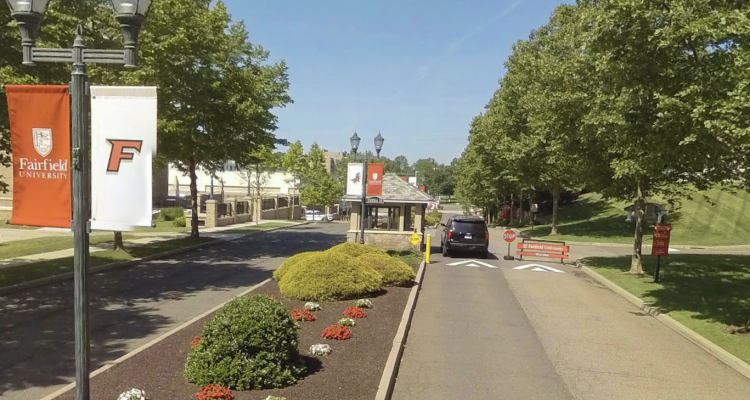Fairfield University’s campus opened last week with a slew of new guidelines for students and staff to follow in order to prevent the spread of COVID-19. The biggest changes are the new traffic regulations that have been put in place, including the required completion of a daily COVID-19 related health questionnaire prior to entry onto campus, and the new security checkpoint and gate hours at the Barlow Road entrance.
There are only two gates open for incoming and outgoing traffic on campus this semester: the main gate on North Benson Road and the gate on Barlow Road. The Barlow Road gate has a new security booth, but this gate and booth are only open on weekdays.
A new regulation has been put in place to help monitor University members’ and visitors’ health in the form of a health questionnaire available on the LiveSafe App. Everyone on campus and anyone coming onto campus is required to complete this questionnaire. The questions include reporting any symptoms and if you have recently travelled out of the country or to a COVID-19 hotspot. The app will tell the person if they sound healthy by displaying a green check mark, or it will suggest that they go to the health center or another healthcare provider by showing a red “X”.
Fairfield has used the LiveSafe app in previous years as a tool for students to feel safer on campus, providing them with an easy way to contact the Department of Public Safety if needed. Now, the app is an essential part of daily life on campus. Students are required to complete the survey every day and show the completed survey with the green check mark when they enter various public spaces, including all dining locations, the RecPlex and the Stag Bus.
In order to enter campus at either of the gates, people in vehicles must show their green check mark to the security booth attendant to prove that they are not experiencing COVID-19 symptoms.
So far, with only two gates open to enter campus, and taking into consideration the checking of everyone’s green check mark on the LiveSafe questionnaire, traffic has been relatively stable and comparable to previous years. Junior Matt Bevacqua had low expectations for the new traffic regulations, but was pleasantly surprised upon returning to campus.
“I had mental images of North Benson Road being like a parking lot 24/7 anytime I wanted to get on or off campus, but as long as they can see my LiveSafe check mark, it barely takes any time at all,” he said.
For students without cars on campus, it would seem that calling an Uber from campus would be harder this semester, but it hasn’t caused any problems yet. Senior Anwen Su has Ubered on and off campus a few times since arriving back on campus. The only difference from last year is having to wear a mask and show the green LiveSafe check mark at the gate.
“Ubers should still be allowed on and off campus as long as the drivers stay in their cars,” she said.
Students riding in Ubers must have completed their health questionnaire to get back onto campus, but Uber drivers do not have to complete it as long as they stay inside their cars when they enter campus.
With the implementation of the LiveSafe health questionnaire, there is the possibility that people lie about their answers in order to gain access onto campus and other areas like the dining spaces, which poses a risk to others on campus. People, students especially, not telling the truth on the survey “makes it harder to police student activity and know who is following rules and doing things they shouldn’t,” said Su. However, Fairfield remains hopeful that students will continue to do the right thing.
Todd Pelazza, director of the Department of Public Safety, has an optimistic view of this.
“We are counting on everyone to be honest in their answers. This will help us in keeping the community safe,” he said. “With everyone completing the daily health verification survey we will be able to quickly identify and get guidance resources to them.”
However, Dean of Students William Johnson stressed the gravity of the situation. “There is not much that we can do about someone being dishonest in the moment, but if we can determine that an individual intentionally provided false information through the LiveSafe app there will certainly be repercussions,” he said. He hopes that students will continue to fill out the health questionnaire truthfully.


Leave a Reply